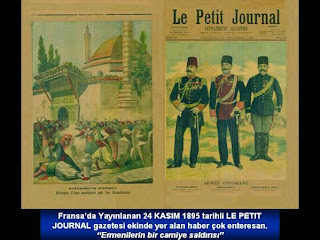
This is the news taken from a French newspaper on 24 November 1895
Armenians attacking to a mosque in Istanbul
But H. Res. 106 has far more to do with the power of ethnic lobbies in Washington than with larger U.S. foreign policy interests. The reality is that Armenian and Greek lobbying organizations hostile to Turkey command far more power in Washington than do pro-Turkish groups. And in their effort to settle old scores dating back to World War I, they have the potential to damage our current ability to maintain Turkey's cooperation in stabilizing Iraq, where upwards of 140,000 American troops are stationed, and to do grave damage to our relationship with an ally of long standing, a country that has long been a bulwark against regional rogue states like Syria. For many years, Turkey was the only Muslim nation in the Middle East to have trade and diplomatic relations with Israel.
But today Turkey has plenty of reasons to worry about current trends in Iraq. Were the United States to "redeploy" its forces out of Iraq or to dramatically scale back its military presence inside the country, it would result in a power vacuum that would be filled by al Qaeda in Iraq and like-minded Sunni jihadists on one side, and by the rogue regime in Iran and its Shi'ite allies on the other. If U.S. forces pull out or have their operational effectiveness crippled by harsh restrictions that Rep. John Murtha is pushing for with Mrs. Pelosi's consent, the country would be plunged into all-out civil war. One likely result would be the creation of millions of additional refugees; it is not difficult to imagine that at a minimum hundreds of thousands of these refugees would stream towards the Turkish border and that Ankara would come under intense international pressure to admit them as a sign of its goodwill.
One of the most underreported stories of the Iraq war has been the extraordinary restraint shown by Turkey in dealing with a volatile situation in northern Iraq -- particularly the advent of a quasi-independent Kurdish state there. Ankara's relations with the Kurds have been characterized by tension and violence. (Approximately 30,000 people have died in Turkey since the early 1980s as a result of a terror campaign launched by the Kurdistan Workers' Party, or PKK). But even as it was coming under fire from Kurdish terrorists, Turkey beginning in 1991 assisted the United States in providing support for the establishment of an autonomous Kurdish region in northern Iraq which was protected from Saddam Hussein's military by the U.S.-instituted no-fly zone. Since the current Iraq war began in 2003, the PKK has had a resurgence in southeastern Turkey. The Ankara government complains that the dominant Iraqi Kurdish groups, the PUK and the KDP, have done little to stop the PKK from using Iraq as a base.
And in the coming months, the situation in northern Iraq is likely to become much more threatening to Turkish interests. Sunni and Shi'ite Arabs, Turkmen and Iraqi Christians are all upset about Kurdish plans to incorporate the oil-rich city of Kirkuk, which officially lies just outside the Kurdish-controlled region of northern Iraq, into a de facto Kurdish state. They accuse the Kurds of seeking to drive them out of Kirkuk in advance of a scheduled December referendum on the city's future to ensure that voters who will support the Kurdish groups' position. As Kurdish authorities come under fire for removing non-Kurds from Kirkuk in advance of the referendum, Shi'ite expellees are joining the Iranian-backed Mahdi Army militia, while Sunni Arabs are joining al Qaeda affiliates, who are blamed for a rash of suicide bombings in Kirkuk since last summer.
At such a dangerous time, the United States needs to be working more closely with both our Kurdish friends in Iraq and our Turkish allies. But Mrs. Pelosi seems more interested in playing ethnic politics in order to score some cheap political points and win additional votes.